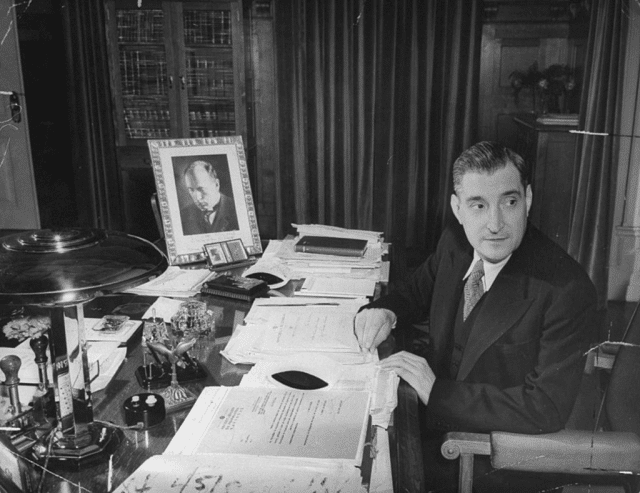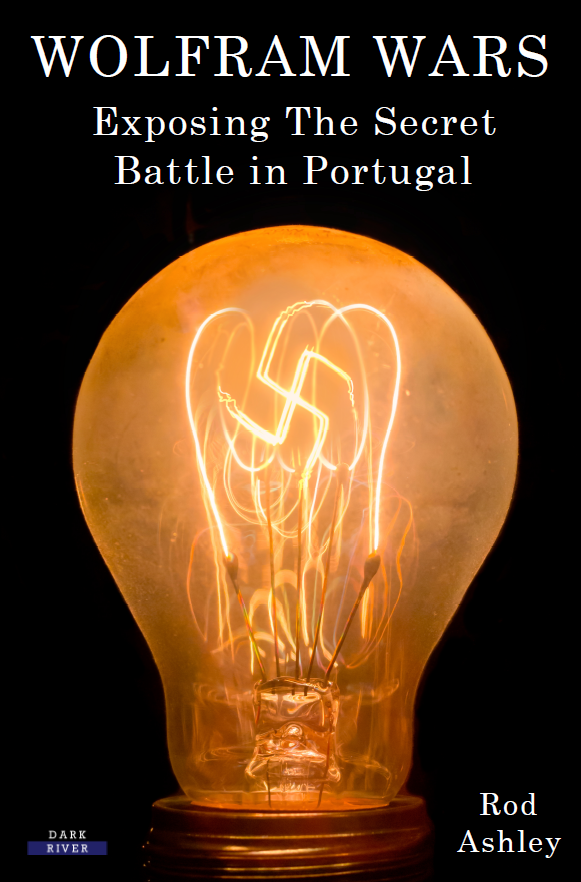An excerpt from Wolfram Wars by Rod Ashley
*
Portugal’s story during these years is also the story of its leader, Dr Antonio de Oliveira Salazar. How could one man wield so much influence and what factors shaped his character, ideals and, ultimately, his actions? This chapter will analyse the rise of Salazar the statesman and reveal a little more about Salazar the man. We shall learn how Salazar’s deeply-held beliefs, developed in his formative years, together with his uncompromising personality, made a significant contribution to the conduct and outcome of the Second World War.
The making of a future dictator
Antonio de Oliveira Salazar was born in 1889 in the central Portuguese region of Beira Alta (which would prove to be one of the regions affected deeply by wartime wolfram mining). As sometimes happened in Portuguese families, he took his mother’s surname, Salazar, rather than his father’s. She was the more influential parent, who set her own and her son’s ambitions above those achieved by her husband. Whilst not wealthy, his parents were landowners in what was essentially a feudal system and they could afford for him to attend school. Like many other intelligent boys of his generation, he was guided into a Roman Catholic seminary between the ages of 11 and 18 with the prospect of training to become a priest. This early childhood shaped an acceptance of authority in him, as well as obedience and, a concept which is difficult for a modern, secular society to comprehend, that of the ‘grace of suffering’. However, whilst he remained devout throughout his life, another calling beckoned.
Salazar studied law and economics at the venerable University of Coimbra, renowned for both its intellectual rigour and its traditional values. He then embarked on post-graduate studies, taking his doctorate in 1918 after he had already begun teaching economics there. Whilst at Coimbra, he also led a group of Roman Catholic intellectuals – the Academic Centre for Christian Democracy (or CADC) – who criticised the First Republic for its economic and social instability, as well as its anti-clerical stance. Through this involvement, Salazar started to establish himself as an influential economist.
*
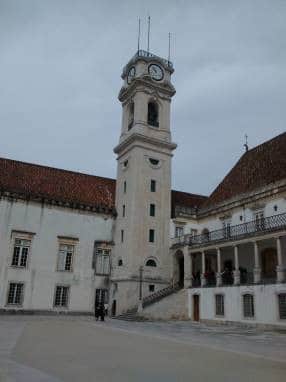
[above] Figure 12. University of Coimbra Tower.
*
In 1921, Salazar was elected to the National Assembly as a representative of the CADC, although it was, for him, an unhappy experience. [13] His political career took off from 1926 when the military powers overthrew the First Republic. After a mere five days, his strict austerity proposals had been thrown out by the military government. Just two years later, however, he was being regarded as the potential saviour of the Portuguese economy and nation, and by July 1932 he was appointed Premier – a post he would hold until incapacitated by a brain haemorrhage in September 1968.
Father of the nation
A love affair which turned sour at an early age is the only romantic association Salazar had. There was, though, one woman who remained loyal: his housekeeper Maria, who had first served him in 1915 when he was a student, remained with him throughout his life, introducing into the household two little girls, one an orphan. He treated them both as surrogate daughters, expressing regret that he never had a marriage or children of his own. However, Salazar was wedded to another concept – fatherhood of the nation.
Once elected as Prime Minister, he embraced the concept of ‘primus inter pares’ (‘first among equals’), filling his Cabinet with fellow academics, though none as intellectually capable as himself. He showed total dedication to his political cause and expected the same of others. Indeed, he was fearful of a future Portugal which did not embrace the same principles that he espoused. These principles were to make his handling of both the wolfram and the Azores issues particularly tricky for others to deal with, as we shall see, to the extent that on more than one occasion, Churchill described him as ‘impossible’. Financial and organisational skills such as his were in short supply at the time and, perhaps because of a lack of trust in others, between 1932 and 1939 he held multiple Cabinet portfolios. He loved the detail of policies, rigorously interrogating their political, financial and theoretical bases as if he were reading a doctoral thesis. Similarly, he brought an intellectual rigour and ruthlessness to demolishing others’ arguments. Possessing a voracious capacity for hard work, he rose early, worked assiduously until lunchtime, took an afternoon stroll and then returned to his work till late in the night when he might permit himself a little relaxation – by reading economic papers.
Whilst passionate about his own policies and vision, he was not a charismatic leader and he lacked the common touch – not for him the public displays of oratory demonstrated by his contemporaries Hitler or Mussolini. Salazar’s first biographer, Egerton, reports a significant yet typical response by a crowd in 1941:
“As they passed the building of the Ministry of Finance, they looked up at Salazar, and their faces expressed confidence rather than enthusiasm, reverence rather than blind devotion.” [14]
In the same way that Salazar rose to become leader of the government, his graduate studies flat-mate at the University of Coimbra, Manuel Cerejeira, rose to be a Cardinal and leader of the Church in Portugal. This lifelong friend summarised the baffling contradictions he saw as follows:
“Salazar walked on a straight road, oblivious of side turnings. He was a man for great issues, also for small detail. In his youth he had already developed tenacity of will, high intelligence and absolute calm. Those of us who knew him recall his rare capacity for objectivity in discussion. He had the art of outlining a theme with fine irony, but was scornful of eloquence. Now, as then, he starts a thing with a timid gesture, hesitates before committing himself, needs to feel he is supported. But then he throws himself into action. I have never observed such contrasts in a man. He appreciates the company of women and their beauty, yet leads the life of a monk. Scepticism and zest, pride and modesty, distrust and confidence, the most disarming kindness and at times the most unexpected hardness of heart – all are in constant conflict within him.” [15]
Estado Novo
In 1926, Portugal embraced fully the Estado Novo [New State] through a coup d’état which overthrew the remnants of what had become a chaotic First Republic (described in Chapter 2). Like this Republic, rather than having a clear set of positive values, for many citizens it was easier to see what the new authoritarian regime stood against and some historians [16] argue that it did not have a fully-developed ideology. The movement was repulsed by Communism, liberalism, socialism and any anti-colonial views – and this was to prove a cause of much tension as Portugal’s former colonies actively sought independence in the 1960s. By contrast, the Estado Novo embraced a totalitarian view of life. It was conservative, nationalistic and underpinned by strict adherence to Roman Catholic doctrine. It was the moral certainties of this faith, eschewing the shades of grey tolerated by other faiths, which Salazar sought to translate into the nation’s psyche and heart. To support his aims, the secret police force, the PVDE (Polícia de Vigilância e de Defesa do Estado / State Defence and Surveillance Police) was created. This body, modelled on the Gestapo, ensured that citizens adhered to the script, in much the same way that writers like Kafka [17] and Orwell [18] were to describe later of fictional, totalitarian regimes.
The regime’s fascist-leaning approach instilled a sense of order into the chaos and, at last, gave a glimpse of economic stability. It was this precious, hard-won quality which Salazar clung to and which dictated his own policies for his entire premiership, in particular his fear of destabilising the country through engagement in war. Whilst on the face of it there might be similarities with Fascist states in Europe at the time (and indeed, Salazar was reputed [19] to have a photograph of Mussolini on his desk to provide inspiration), there were distinct differences from other regimes. The Estado Novo was neither racist nor anti-Semitic; it was paternalistic in its view; and no other European political movement was so intricately entwined with a religious faith. It was also an inward-looking state, again in contrast to the European Fascist regimes. Indeed, Salazar had no taste for internationalism – he was disdainful of organisations like the League of Nations (as he would be in the future to its successor, the United Nations), and of international movements or theories like Communism.
Financial saviour?
Entering government in April 1928, first as Finance Minister, Salazar believed that economic prosperity could only be achieved through tough, centralist control, resisting any attempts at modernisation and ensuring that traditional ways of life and values continued unsullied.
*
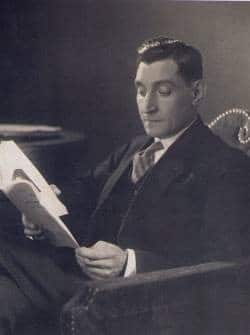
[above] Figure 13. Salazar, the young Minister of Finance, reading.
*
Certainly he displayed a rare financial ability, and maintained close control of the nation’s finances, even after election as Prime Minister in 1932. In the eleven years before he took office, the nation’s deficits totalled 2,574,000 contos (one conto equated to a thousand escudos, the currency of the time). Salazar believed fervently that the books must always balance and he espoused the virtues of thrift, hard work and patience. In the first eleven years of his financial ministry (between 1928 and 1939), not only did he wipe out this enormous deficit, but created a surplus of 1,963,000 contos (at that time equivalent to about £20 million). What he would make today of the spending of EU money by the island of Madeira on a football stadium to celebrate the local hero, Cristiano Ronaldo, can only be surmised.
During the 1930s, the focus was on economic growth by building up basic services and infrastructure that would make expansion possible. These motives were not simply financial – they were also doctrinal in keeping the populace engaged in traditional industry and agriculture.
By 1937, Salazar’s achievements in economic management included developing some of the infrastructure of the country. In order of expenditure, the top three investment areas were physical improvements (particularly ports, roads, irrigation and hospitals), followed by defence, and then repayment of the national debt. In particular, he invested in irrigation and hydro-electric projects. The Portuguese population was, for a large part, too uneducated to assume anything other than that the government knew what it was doing. One of the quirks of his term in office was that he did not invest sufficiently in education, leaving many citizens unable to read or write. Kay contends [20] that the 50% illiteracy rate remained because the dictator earnestly believed that his people needed to be ‘cradled’ for a long time before they were able to truly benefit from such liberating concepts as literacy, education and democracy. He felt the whole weight of the nation’s heritage on his shoulders and was disinclined to share that burden with lesser mortals.
Dealing with dissenters
To translate his vision into reality, Salazar needed assistance from others – the military, the Church, and the secret police force he had established as Prime Minister in 1933. The 2,000 staff of the PVDE ensured that citizens toed the line. Adherence to religious doctrine was enforced in schools; and armed service personnel were required to swear allegiance to the Estado Novo and were banned from marrying non-Catholics. [21] Communities were actively encouraged to advise the PVDE (or their 10,000 part-time informers) of any non-conformist activity in their neighbours and families. The media was strictly censored, the PVDE was used to keep left wing, dissident groups under control and many opponents were interned in prison camps on the Azores and Cape Verde Islands. Salazar summed up the character of his citizens thus:
“The Portuguese peasant is religious and will remain so despite the ravages caused in his mind by the scandalous anti-clerical republic. On the other hand he is superstitious with a superstition which survives from an old paganism sometimes related to devil worship. He is sober when he has not too much money to spend, and he lives simply with few wants. With the exception of a few large landowners he is poor but does not complain. The Portuguese peasant has an air of contentment, if not of happiness, which it is a pleasure to behold. He is extremely easy to govern.” [22]
There is no question that the dictator was shaped by a perspective which seems at odds with today’s more open, materialistic world. For the devout Salazar, there was a tension between the attainment of a religious ‘grace’ through suffering and, set against this, the belief that it was man’s right to share in the decisions that shape his life. He believed that there could be social solutions to social problems and that salvation might be achieved through attaining social justice in the world. This complex, at times seemingly contradictory perspective, was underpinned by a Vatican encyclical, Rerum Novarum, (‘Of revolutionary change’ in English) published shortly after Salazar’s birth – and he appears to have almost adopted this as his childhood mantra.
Salazar’s handling of the wolfram question will be uncovered in a following chapter. Suffice it to say, here, that whilst he disapproved of some espionage actions, he supported the work of the PVDE. Indeed, he felt that a crucial role of the police force was to eradicate terrorist or extremist citizens (some of whom simply took exception to his Estado Novo policies), and felt that it was justifiable to mete out ‘a little rough handling’ …. to make an example …. ‘of such wretches’. [23] Part of the leader’s deception of his own people was to misrepresent the power and influence of Portugal globally. As we have seen, Portugal was an influential country, punching above its weight in international discovery and trade, yet wedded to the past. Estado Novo propaganda of the 1930s included a map of how citizens should not consider Portugal to be a small country but a large and influential one. Created in 1934, this map was on the wall of every schoolroom. It extolled the power and influence of Portugal and its African colonies by purporting to show that with its two principal African colonies – Angola and Mozambique – superimposed on a map of Europe, it was too significant a power to ignore.
*
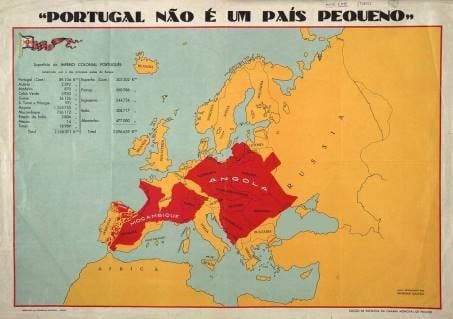
[above] Figure 14. ‘Portugal is not a small country’ by Henrique Galvão. This propaganda map of 1934 shows Portuguese territories like Angola and Mozambique superimposed over Europe.
*
Despite his draconian rule, by the outbreak of the Second World War, Salazar’s reputation was riding high internationally and Portugal had come through the world depression relatively unscathed. The controversy over his economic policies belongs to the post-1945 era.
Lacking charisma and a rhetoric which reached out to ordinary people, combined with his distaste for the trappings of power, Salazar was inevitably low-profile. Other international leaders may have found it difficult to understand the forces which drove him, as all they saw was a difficult man, obstinate and unbending, invoking the heritage of the state and the Church in getting his way. And yet this is something of an over-simplification because the underpinning principles of his attitude towards wartime neutrality, the wolfram question and the Azores question were deeply-rooted in the political state which he developed, as we shall see.
The Azores – a thorny problem for Salazar and the Allies
One area which marks out Salazar is his view on the Azores, that archipelago of islands off the West African coast which today is seen either as a staging post for transatlantic solo sailors or as a remote, beautiful holiday destination. Therein lies its charm and also its strategic importance. A glance at a globe reinforces the huge expanse of the Atlantic Ocean compared with the land masses either side. Being two-thirds of the way between New York and Lisbon, the Azores provide that vital stopping-off point, be it as shelter from adverse weather, for re-stocking with supplies or, in the case of air and sea-transport in the earlier decades of the twentieth century, a re-fuelling stop. Additionally, given the wartime U-boat threat in the North Atlantic, the British viewed the Azores as a potential base for Allied submarines – and feared the threat of Germany invading and creating a U-boat base there. When the United States joined the conflict, they saw the Azores as a vital staging post for transporting supplies, equipment or personnel to Europe and as an ideal static ‘aircraft carrier’ for military planes. Its location in more temperate waters than the alternative northern routes (which incurred greater U-boat threats, possible icebergs, and greater cost in fuel and time) made it uniquely attractive.
Salazar, however, had other ideas. His ardent Estado Novo view of neutrality meant that there should be no foreign military presence in Portuguese territory anywhere. Nevertheless, he was astute in recognising that he needed what Peters and Waterman were to define later in the business world as ‘simultaneous loose-tight properties’ [24] – in other words, core values to be closely embraced but with a variety of elastic strategies which allowed flexible interpretation when responding to changing conditions where necessary.
The British had suggested to Salazar in 1941 that, in the event of a Nazi invasion of Portugal, his government should decamp to the Azores. By 1943, both Churchill and Roosevelt were convinced of the vital role which the archipelago could play as a staging-post. The Americans had adopted a rather gung-ho approach to the potential use of the Azores which had alienated Salazar, whose preference was to deal with the British. Nevertheless, he agreed in negotiations in July 1943 to the Allies’ use of the islands’ military facilities, provided that it was done in a low-key manner so that Portugal could be seen internationally as external to the war. Churchill decided that this was best done under the auspices of the old Anglo-Portuguese Alliance, a decision which caused friction with Washington. Despite this, a positive outcome was reached with agreement by Portugal that Pan Am could use the islands as a refuelling point for their commercial aircraft between the US and the UK – this would also have ramifications for flights into Portugal by Pan Am as we’ll see in a later chapter.
By October 1943, British forces had arrived on the Azores to use the military facilities although, as the agreement did not extend to the Allies generally, the US felt wounded. Salazar had been afraid that any concession would have granted the US permanent access to the islands which, in his narrow world-view, he was not prepared to concede. With Churchill’s support, a delegation to Salazar eventually extracted from him an agreement that both British and US military personnel could use the facilities (under British supervision), provided that Americans wore both British and US insignia, with the US insignia being smaller. Such was the tricky nature of negotiation with Salazar. [25]
An altered viewpoint
By 1943, the Allies felt that a turning-point had come in the conflict and that events were moving in their favour. They argued that the time had come for neutral Portugal to fully back the Allies’ cause and that, post-war, such action would be rewarded. The British gained the support of the Portuguese Ambassador to London, Armindo Monteiro, who sent a closely-argued typed letter to Salazar, decrying his foreign policy and arguing for him to side openly with the Allies. As Lochery observes, Monteiro’s twenty-page letter amounts to the longest political suicide note in history [26] and, not surprisingly, he was recalled and spent his future in relative obscurity. Salazar’s response was revealing not just in content but also in manner. Not only did he decry the views expressed by Monteiro, he attacked his superior tone. Tellingly, Salazar hand-wrote his response on top of Monteiro’s typed text so that future historians could clearly see the point-by-point repudiation of the ambassador’s argument. As an accomplished academic, he thus ensured that the evidence could not be ignored.
Salazar and General Franco of Spain
Salazar’s ongoing relationship with his neighbouring dictator, General Franco, was a significant diplomatic achievement. During the Spanish Civil War, Salazar was terrified of the widespread Communist ideas in Spain, fearing that they would spill across the border into his own righteous, God-fearing country. Consequently, in 1938, he formally recognised Franco’s Fascist government. Just a year later, as the Second World War erupted, Salazar again feared Spain being drawn into war by capitulating to the Nazis, as it would effectively bring the Axis powers right up to the Portuguese border.
Salazar’s determination to align himself with his Iberian neighbour was based on several factors. For many years, the Portuguese had felt that Spaniards stereotyped them as Iberians with their backs to Europe and their eyes set on the ocean. Salazar sought to overcome this and saw Iberia generally (as well as the Anglo-Portuguese Alliance) as guardians against Communism. Even later in the conflict, Salazar was distrustful of the ‘godless’ nature of the Soviet allies and the influence they would have over traditional European values. Much as he disliked the Third Reich, at least it was anti-Communist.
The 1939 Iberian Pact was signed to ensure neutrality, although Salazar never fully trusted Franco not to go back on this agreement, given his own past support for and from Germany. As Prime Minister, he was always convinced that Portugal would have been subsumed into Spain long ago if it had not been for the Anglo-Portuguese Treaty, so the Pact was another means of retaining independence. Despite Salazar’s uneasiness about the relationship, he was highly-praised by Franco, who described him as the most complete statesman, and the leader most worthy of respect that he had ever known. [27]
Salazar’s ultimate impact on the war
So, how do we summarise this complex individual? Was he a world leader of stature or merely an efficient national manager? He made mistakes certainly – his aloofness meant that he did not connect with ordinary people whether in Portugal or its colonies. By the end of his tenure, his view of politics was certainly out of kilter with the democratic impulses of the day. He was ‘brought to power’ rather than ‘swept to power’ because of his financial acumen, possessing a skills-match badly needed by the Portugal of his early ministerial days. Today, the Estado Novo is all but gone in Portugal (other than as a term used for architecture of the period), although the country retains some problems as we’ll see in Chapter 10. As his biographer, Hugh Kay, acknowledges [28], Salazar formed judgements and stuck with them. Whatever means he used to establish these views, he was usually unshakeable once they were formed – even if the world around him was changing. The Azores diplomatic incident marked one of the rare occasions when Salazar changed his mind – but only slightly, without compromising his principles and for the benefit of his own nation. As suggested by one US politician [29], Salazar “and his whole country were living in more than one century” – which is maybe a polite way of saying that he lived in the past.
Since his death, Salazar has been criticised for the shortcomings of the Estado Novo, the brutal repression of dissidents, his narrow world-view and his distrust of colleagues, allies, and even of the Church’s representatives. Other analysts point to his clear sense of national vision, the canny manner in which he held the country together, keeping it out of war and balancing the state’s books. What is clear is that he played a very shrewd game during the Second World War and kept to the spirit of neutrality.
Was Salazar truly a global leader, espousing the qualities of other great national leaders? It is difficult to ascertain the real sense of leadership he gave when, throughout the 1930s and the war years, he was always in the shadow of larger-than-life leaders like Hitler and Mussolini, each of whom established a political and military infrastructure to project their wider European vision. Whilst Salazar was a shrewd economist, the breadth and depth of his view was much more circumspect. He was passionately devoted to Portugal and to the Estado Novo as a way of maintaining both stability and the cultural heritage of the nation. Yet he was also limited by this perspective and he became afraid of the prospect of Portugal diluting its character and power. Whilst he felt that it was acceptable for Portugal to adopt a ‘civilising’, crusading, imperial manner over subjugated colonies, it was not acceptable for his beloved nation’s traditions to be compromised. Additionally, as we will see in Chapter 4, whilst he was tolerant of refugees entering Portugal to escape tyranny, persecution or worse in their own countries, he was also ambivalent about ‘the Jewish question’. He regarded this very much as an internal German matter rather than one of international concern. Is such a narrow world-view compatible with the term ‘world leader’ whereby national leaders express views on international matters even if they do not impact directly on their own nation?
Whilst Portugal was no longer a monarchy, a strong sense of hierarchical power continued to exist, particularly through Salazar’s embracing of the power of the church. His sincerely held religious beliefs may explain some of the shortcomings and weaknesses of his administration which appear so apparent with hindsight. Why deliberately leave the people uneducated and illiterate? Why not devise a strategy for sustaining the short-lived riches afforded by wolfram? Why not use the enormous wealth gained as a result of wartime neutrality for the benefit of the people? Why not recognise, along with other imperial nations, the right of self-determination to former colonies?
Peter Drucker, the Austro-American management writer, argues that ‘management is doing things right; leadership is doing the right things.’ [30] An over-simplification though this is, it neatly summarises the dichotomy which historians have encountered in evaluating Salazar’s rule. Some contemporary British politicians like Foreign Secretary Anthony Eden (who had a sound grasp of Iberian matters) found his ‘conduct incomprehensible in an ally’ [31] and Churchill found him ‘intolerable’. [32] Some post-1970s observers struggle with his world viewpoint (or lack of it) and his tolerance of the thuggery of the PVDE. Others (such as Kay [33]) consider that Salazar did Portugal proud in his deft handling of issues during the Second World War.
What is certain is that Salazar’s canny orchestration of the Allies and the Axis forces – in playing one power off against another – maintained political stability, generated wealth and laid the foundations for a more optimistic future of his country. However, as we shall see in Chapter 7, these achievements were also fraught with difficulty and enduring social problems, particularly in relation to the regions where wolfram was mined.
*
*
13 Wilsford D (ed). 1995. Political Leaders of Contemporary Western Europe: A Biographical Dictionary. Westport, Connecticut: Greenwood Press.
14 Egerton FCC. (1943). Salazar: Rebuilder of Portugal. London: Hodder & Stoughton.
15 Described in: D’Assac P D’A. (1967). Salazar. Paris: La Table Ronde.
16 Wilsford D. (1995). Ibid.
17 The Trial, 1914 (but incomplete)
18 Animal Farm (1945) and 1984 (1949)
19 Lochery N. Lisbon: War in the Shadows of the City of Light, 1939-1945. New York: Public Affairs. p14.
20 Kay H. (1970) Salazar and Modern Portugal. p72. New York: Hawthorn.
21 Birmingham D. (2003). A Concise History of Portugal (2nd ed.). Cambridge: Cambridge University Press. p168.
22 Georgel J. (1981) Le Salazarisme: Historie et Bilan, 1926-1974. Paris: Cujas. Quoted in translation by Birmingham (2003), Op Cit.
23 Ferro A. (1939). Salazar, Portugal and her Leader. London: Faber & Faber. p185
24 Peters T & Waterman R Jr. 1982. In Search of Excellence: Lessons from America’s Best-Run Companies. New York: HarperCollins.
25 Lochery N. 2011. Ibid.
26 Lochery N. 2011. Ibid, p181.
27 Preston P. (1994). Franco: A Biography. London: Basic Books. p454.
28 Kay H. (1970). Ibid. p123.
29 Ball G W. (1968). The Discipline of Power. Boston, Mass.: Little, Brown.
30 Drucker P F. (2003). The Essential Drucker. New York: Harper Business Books.
31 Kay H. (1970). Ibid p179.
32 Kay H. (1970.) Ibid. p181
33 Kay H. (1970). Ibid. p181.

